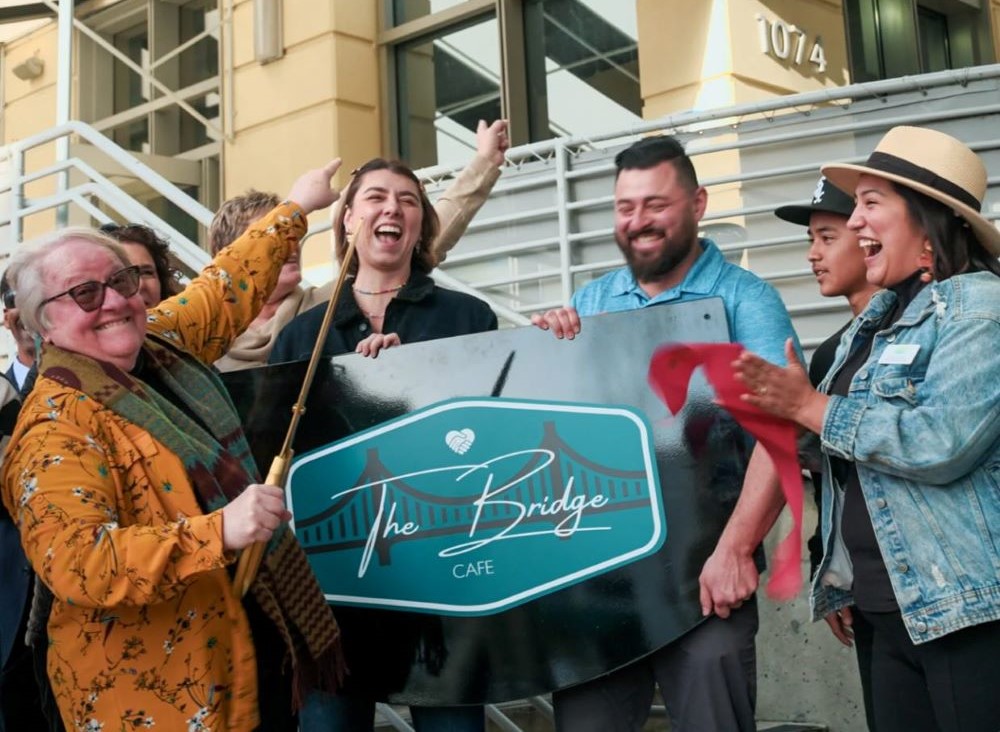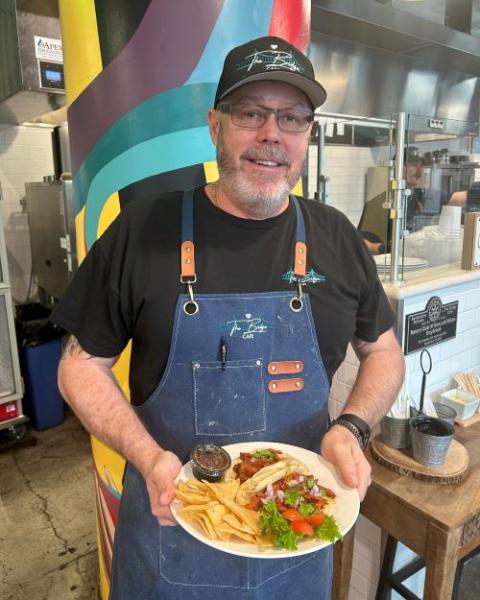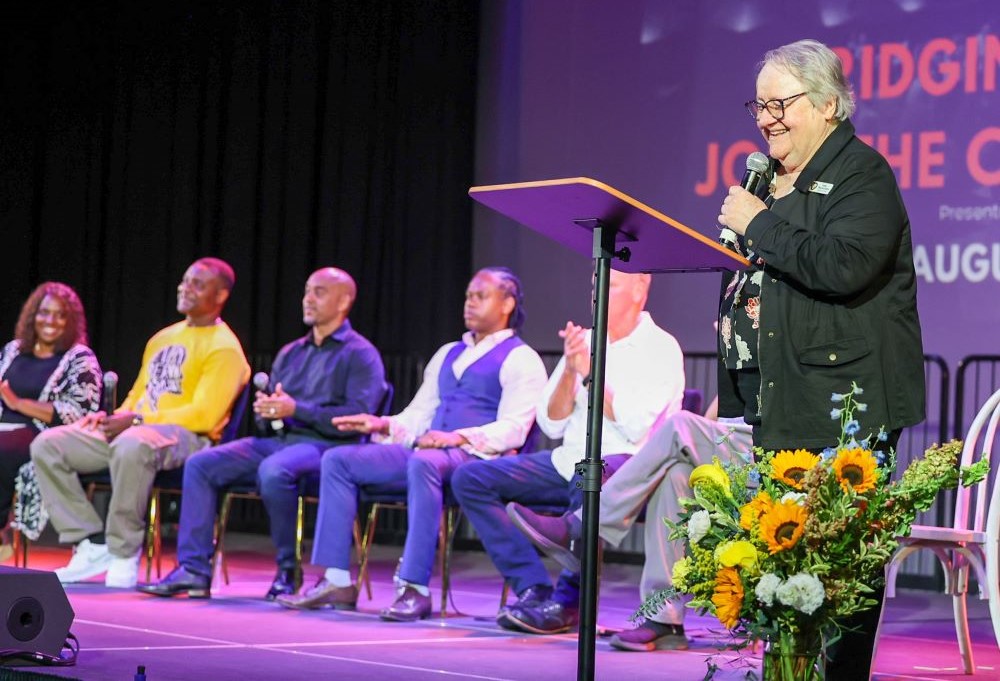
The Bridge Café in San Luis Obispo, California, which trains and employs the formerly incarcerated, opened its doors in February 2023. It is a program of Restorative Partners, founded in 2011 by Sister of St. Joseph of Carondelet Theresa Harpin. (Courtesy of Restorative Partners)
The farm-to-table menu and convenient location of The Bridge Café on Higuera Street in downtown San Luis Obispo, California, draw lunch hour patrons like judges and lawyers from the county's district court complex a block away.
Because the café trains and employs local people who were formerly incarcerated, it isn't unusual for workers to find themselves waiting on customers they'd met before in very different circumstances, said Sister of St. Joseph of Carondelet Theresa Harpin. She is executive director of the nonprofit Restorative Partners, which opened the café in 2023.
Harpin remembers spotting a district attorney who stepped up to the counter for a cup of coffee and found himself face to face with a woman he'd once prosecuted and saw sentenced to jail for crimes related to her addiction. She is now clean, sober and employed as a barista.
"He looked at her and said, 'Well, isn't this a much better place to meet?' " Harpin recalled. "I watched her eyes well up with tears — they were streaming down her face as the D.A. took his order and left.
"I asked her what that moment was like for her, and she said, 'He saw me as a human being, not as I was on my worst day. He saw I'm more than that.' Later, I asked the attorney what the encounter was like for him, and he said, 'In my work, I never see many of the people (I prosecute) in court again. This time, I got to see the fruit of her labor.' "
Changing the lives of those who have gone through the criminal justice system — and changing public perception of rehabilitation — is the goal of Restorative Partners, founded in 2011 by Harpin, a longtime activist and member of her congregation more than 40 years. The organization offers educational and intervention programs for both adult and juvenile inmates of jails and prisons. It also provides hands-on help for recently released men and women trying to navigate their reentry into society.
"A prison sentence shouldn't be a lifelong punishment," Harpin said, pointing out that a criminal history can affect someone trying to obtain a professional license, loan or insurance, pursue an education, adopt a child or sign up as a volunteer. Although the U.S. Equal Employment Opportunity Commission notes that an employer making hiring decisions based on an individual's conviction records may, in some instances, violate federal law, employers generally don't have to reveal the reasons someone was turned down for a job.
Harpin said many employers can't get past an applicant's criminal history.
"(Inmates) who worked in the jail kitchens, some of them receiving training or ServSafe certification (food handler certification through the National Restaurant Association), were being released, but they couldn't get jobs. What a waste," she said. "We discovered that a social enterprise like The Bridge Café was another way to create jobs and put a real face on those who'd worked behind the jail walls and prison gates to the public."
Harpin located a building that could be used for the café, applied for county funding, and turned to local Cuesta College to design a condensed program that would give recently released offenders who enrolled as students faster access to training, a culinary certificate and a job.
'A prison sentence shouldn't be a lifelong punishment.'
—Sr. Theresa Harpin
Graham Yates, a culinary instructor at Cuesta, said the five-month training program covers topics including kitchen safety, knife skills, baking, cooking methods and plating techniques. He estimated that since 2022, he's taught 15 students from Restorative Partners who've received certificates.
"RP students are grateful for the opportunity, eager to learn and excited for their next chapter," Yates said.
The Bridge Café's general manager and chef, Jason Hunter, puts personal touches on the menu, which includes house-made quiche and fresh-baked scones. He also trains line cooks and bakers in the restaurant. After almost a decade in the criminal justice system, he's making the most of a second chance.
In his 20s, Hunter enlisted in the military. His assignments included Somalia and Iraq, where an attack on him left both physical and emotional scars. Once discharged, he turned to drugs, supporting his habit by selling them, he said.
Within five years he'd been arrested twice, resulting in first a one-year, and then a three-year sentence. By his third sentencing, he was facing a dozen felonies. The prospect of more time behind bars felt unbearable. A chance meeting with Harpin at a religious service in prison made him realize his addiction was curtailing his freedom. After his release, Restorative Partners helped pay for his culinary training and hired him at the café.

Jason Hunter is general manager and chef at The Bridge Café in San Luis Obispo, California. He spent almost a decade in the criminal justice center. (Courtesy of Restorative Partners)
Hunter, who said he's been clean for 11 years, got his felonies expunged from his record, and has petitioned the court for a governor's pardon.
"We are people just like you," he said of released offenders trying to live and work in communities. "We just have made some bad choices in life, but people who are suffering from addiction do recover. I am a living example."
In addition to the café, Restorative Partners also offers job opportunities with a solar installation training program through GRID Alternatives, a California-based nonprofit. Since its inception, Restorative Partners has worked with community groups, universities, businesses, other faith-based groups and government organizations — like the San Luis Obispo sheriff's office and probation department.
Cindy Ayala, Restorative Partners' mission and restorative justice implementation director, said collaboration with local, county and state government agencies allows access to places like Juvenile Hall, a county detention facility for youth — where Restorative Partners operates 18 programs — and the California Men's Colony, a state prison where the organization works with a Los Angeles-based nonprofit, Healing Dialogue and Action, to run a 16-week course that helps prisoners look at the reasons that led to their incarceration, and the impact of their crimes on victims.
Restorative Partners' partnering continues during the reentry phase for individuals, supplementing or enhancing existing services within those agencies, and often providing services that aren't offered by those county or state programs where correctional departments tend to focus more on punishment than rehabilitation.
"One RP participant's comment was that programs inside the jail stop when someone is released," Harpin said, "but RP continues to accompany the person after that release."
State and county agencies make referrals to Restorative Partners, and clients sign a release form allowing staff to work as "an interdisciplinary team" with probation officers, mental health practitioners or others connected to their release, in order to tailor individualized reentry plans, Ayala said.
Plans first address basic needs such as a place to live, a job and documents needed to work, she said. Programs address issues that include anger management, domestic violence prevention and substance abuse courses. A basic finances class helps people put together a budget, open a bank account, understand credit or start a small business.
At Restorative Partners' drop-in center, anyone who has gone through the criminal justice system is eligible for assistance in things like getting an ID, preparing a resume, doing mock interviews, even workshops on learning social skills.
"We've realized that there's a lot of mentoring and hand-holding that sometimes needs to happen," Ayala said. "I had one man who'd been incarcerated for many years, was released and went to the grocery store to shop. He said, 'They don't have cashiers anymore. It's all machines now. My cart was full and I saw that I'd have to do this myself. I had a panic attack. I left my cart and walked out of the store.'
"We incarcerate for many, many years and then we expect people to have the necessary skills when they get out. And if we don't invest in doing those efforts, that's when we see the recidivism rate go up because people just get overwhelmed. You definitely see the impact of a restorative approach versus a traditional approach, and statistics show it."

Sister of St. Joseph of Carondelet Theresa Harpin speaks at a fundraising event for Restorative Partners in August. The California nonprofit partners with businesses, government agencies and other organizations to change the lives of those who have gone through the criminal justice system. (Courtesy of Restorative Partners)
In a 2020 annual report, Restorative Partners noted that while California's recidivism rate is 50%, according to the California state auditor's website, the recidivism rate of released offenders going through its own program is 12%.
The same report also pointed to statistics from California Legislator's Analyst Office, a nonpartisan fiscal and policy adviser, showing that the cost of one year in a California prison is $81,203. The cost of one year of participation in a Restorative Partners program is $33,361.
Ayala said Restorative Partners, which gets funding from a mix of government contracts, grants and fundraising, faces challenges ahead for the population it serves.
"There are more mental health issues among our clients, and we don't see that changing any time soon," she said. "I would say that enough affordable housing is almost a bigger problem than employment. We can get them jobs, but if they're earning minimum wage, there's no way they can live here in San Luis Obispo — it's becoming more difficult."
When it comes to offenders in the criminal justice system, public opinion can be mixed — or even nonexistent.
Sister of St. Joseph of Carondelet Suzanne Jabro worked with Harpin in 2006 on a program that brought children to see their incarcerated parents. Jabro, the founder of Border Compassion, a volunteer group that brings interfaith communities together with asylum seekers at the California border, said indifference is the sickness of society.
"Many people don't want the burden of knowing. They don't want to get too close to where it affects them," Jabro said. "Yet if you do, it changes you."
Harpin said many offenders who have caused harm have been harmed themselves through indifference, neglect and abuse.
"Practically in 99.9% of these cases, I've met the traumatized child inside these adults, and no one was addressing that. The criminal justice system was to hook them, book them and forget them. These are human beings without the coaching, educating and parenting we take for granted in our lives because we're privileged," she said. "But when you see through the eyes of another brother or sister, that stops people in their tracks."
Advertisement






